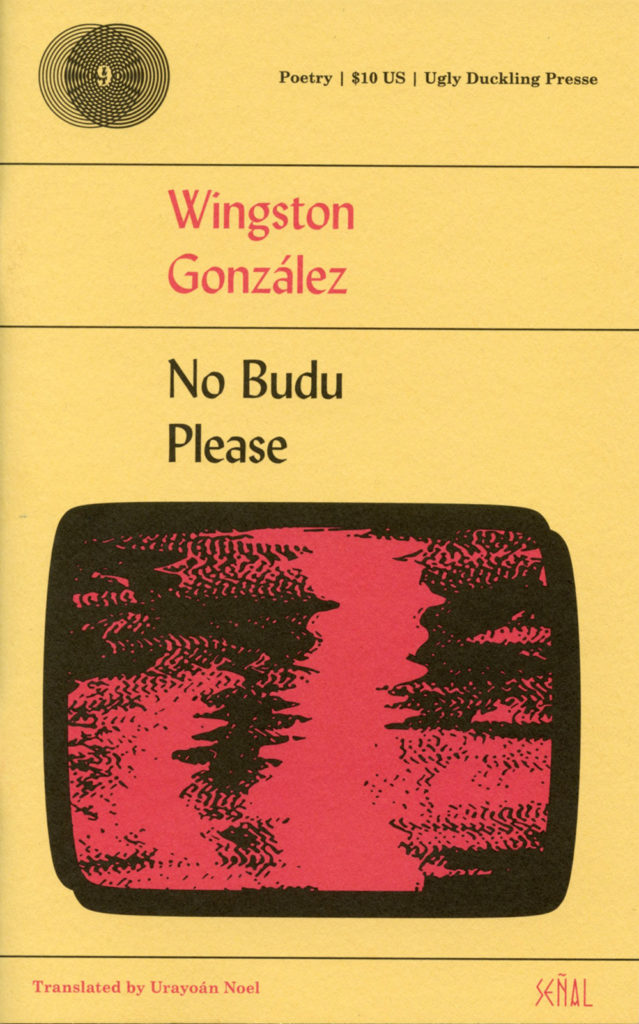Ugly Duckling Presse 2018
232 3rd St #E-303
Brooklyn NY 11215
347-948-5170

No Budu Please
Wingston González
Translated by Urayoán Noel
December 2018
whos coming. fock you. I complain.
I complain. I tend to bite my lip at
parties an not danse. I complain. like
a drug my body dispersed into da
cartilage of da boy dat stares at da
ekcess frum afar. godless lanscapes.
dey are not Ethopian anjels. dey wan
a rasta boy who can sing a myth a star
a glass of gifiti
no budu please
… a tantalizing toying with the eye and ear.
LaTasha N. Nevada Diggs
No Budu Please emerges in the voice of “an artificial boy in some sort of plastic prairie,” as he zeroes in on desire, spirit, and diversion. A diversion for all those forgotten and on the outskirts, impenetrable. Wingston González has carved out a distinctive way of creating beats with words, a spiritual questioning of godliness, and a space of immersion in a Garifuna history marked by the 1797 expulsion from St. Vincent and subsequent exile to the coast of Central America. One of the most prolific Garifuna writers today, González has built a window into contemporary Black indigeneity in Mesoamerica, but also closed that same window in a sidelong attack on colonialist language and syntax, rewriting Spanish as he goes. Urayoán Noel’s translation moves the ludic experimentation with Spanish into an English that also tears at the colonial heart of Occidental imaginings. Both books insist that colonial fantasies are not to be stomached, that there is no easy way in or out of reality or dream, rather a series of glacial contradictions and bloody yearnings.
About the Author
Wingston González (Livingston, Guatemala, 1986) is a textual producer. In addition to poetry, he has worked in the fields of dance, visual arts, music, and artistic action. His published work includes Los magos del crepúsculo [y blues otra vez] (Cultura), CafeínaMC: segunda parte, la fiesta y sus habitantes (Catafixia), CafeínaMC: primera parte, la anunciación de la fiesta (Folia), san juan – la esperanza (Literal; Germinal), Miss muñecas vudu (Germinal), Espuma sobre las piedras (Catafixia; in collaboration with choreography by Alejandra Garavito), traslaciones (Cultura; winner of the 2015 Luis Cardoza y Aragón Mesoamerican poetry prize), ¡Hola Gravedad! (hochroth; tr. by Timo Berger into German), and Nuevo Manual de Procedimientos para una Educación Sentimental 1 (YAXS; with illustrations by Bernabé Arévalo).
Praise
It is voice of the Mokko of Nigeria, the Arawak, the Taino, the Black Carib, the exiled by way of British colonial rule, the shipwrecked and the assimilated that inform s these verses. Bob Kaufman as houngan. Neruda as trickster. Césaire as natural mystic. The beauty of the here and the between in this small collection is a tantalizing toying with the eye and ear . And thus begins the story. What does it mean to slurp an island? To be a child of 80’s TV? To be Garífuna? To be neighbor to wichdoctors? Here, the actual linguistic transformation of S panish and indigenous threads within the Garífuna community of today and between, González’s overa ll playfulness with history, myth and ode. What Noel seamlessly does in his translation of Gonzále z’s work by embodying a Trans-Atlantic phonetic assemblage of Black English that comprises the Car ibbean, North America and the UK is both a phenomenon and a careful, mindful engagement with a poe tics shifting at will because shape shifting - as a black and brown experience - is inherent. Call it gumbo surprise. Tres leche wit a soda pon da syde. ya solo sabe ber las luses.
LaTasha N. Nevada Diggs
About the Translator
Urayoán Noel is the author of 10 books, including Transversal (University of Arizona Press), a New York Public Library Book of the Year, and In Visible Movement: Nuyorican Poetry from the Sixties to Slam (University of Iowa Press), winner of the LASA Latino Studies Book Prize. He is the translator of No Budu Please by Wingston González (UDP) and the editor and translator of Architecture of Dispersed Life: Selected Poetry by Pablo de Rokha (Shearsman Books), a finalist for the National Translation Award. Noel also translated the concrete poems in Amanda Berenguer’s Materia Prima (UDP), which was a finalist for the Best Translated Book Award. A translator for The Puerto Rican Literature Project (PLPR), Urayoán Noel teaches at New York University and at Stetson University’s MFA of the Americas.
In the News
Links
Publication Details
ISBN: 978-1-946433-19-0
Chapbook
staple-bound. 32 pp, 5.25 x 8.25 in
Publication Date: December 01 2018
Distribution: Asterism Books (US)
Series: Señal #9

